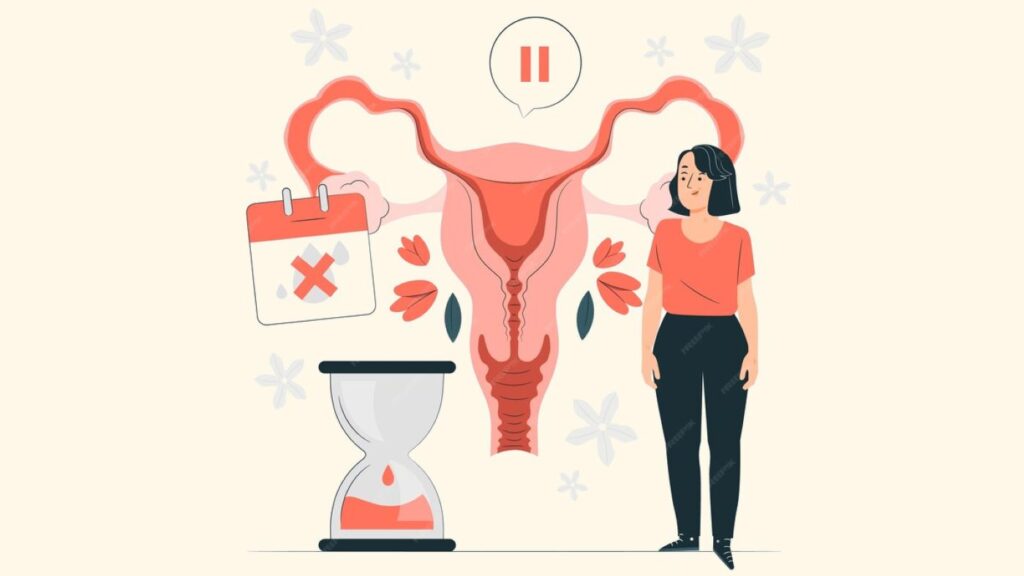No products in the cart.
Women’s Health
Signs that Menopause is Finally Over
Menopause is a natural biological process that marks the end of a woman’s reproductive years. However, the symptoms and timeline of menopause can vary from person to person, making it difficult to determine exactly when it is over.
Are you wondering how to know when menopause is finally over? You’ve come to the right place. In this article, we will guide you through the signs and signals that indicate the end of menopause, helping you understand when you can finally bid farewell to the hot flashes, night sweats, and mood swings.
What is Menopause?
Menopause is a normal stage of a woman’s life that often happens between the ages of 45 and 55. It is characterized as the cessation of menstrual cycles for at least 12 months. During this phase, the ovaries stop releasing eggs, and hormone output drops dramatically.
As a result, women endure a variety of symptoms, both physical and emotional. Understanding the stages and symptoms of menopause is critical for determining when it is ultimately over.
Stages of Menopause
Menopause is often broken down into three stages: perimenopause, menopause, and postmenopause. Perimenopause is the transitional period before menopause, which can last anywhere from a few months to several years. During this stage, hormone levels fluctuate, resulting in irregular periods and other symptoms.
Menopause is officially reached when a woman has not had a menstrual cycle for 12 months in a row. Postmenopause refers to the years after menopause when symptoms normally lessen and women enter the post-reproductive stage of their life.
Symptoms of Menopause
Menopause is frequently associated with a wide range of symptoms, which vary in strength and length. Common symptoms include hot flashes, nocturnal sweats, mood swings, vaginal dryness, sleep difficulties, decreased libido, and skin and hair changes.
These symptoms have a substantial impact on a woman’s quality of life and general well-being. However, it is crucial to note that not all women have the same symptoms, and the severity varies from person to person.

How Long Does Menopause Typically Last?
Each person’s menopause lasts different amounts of time. Menopause might last between 4-5 years on average. Some women may endure symptoms for a short length of time, while others may have them for a decade or more.
Genetics, overall health, and lifestyle choices all determine how long menopause lasts. Menopause is a slow process, and symptoms may appear and disappear.
Signs That Menopause is Coming to an End
The absence of monthly cycles for at least 12 consecutive months is one of the most reliable markers that menopause is ending. However, this alone may not be sufficient to support this conclusion, as hormonal imbalances or underlying health issues can sometimes induce irregular periods.
To assess whether menopause has ended, various signs and symptoms must be monitored. These could include a decrease in the frequency and intensity of hot flashes, better sleep patterns, stabilized mood fluctuations, and a general reduction in menopause symptoms.
Factors That Can Affect the Duration of Menopause
The duration and severity of menopause signs can be influenced by a variety of factors. Hormonal imbalances, lifestyle decisions, underlying health issues, and certain drugs can all have an impact. Women who smoke or have a medical history, for example, may experience more severe or longer symptoms.
It is critical to contact with a healthcare expert to determine the specific factors that may be influencing your menopausal symptoms.

Coping Strategies for Managing Menopausal Symptoms
While menopause might be difficult, there are techniques you can adopt to effectively manage the symptoms. First and foremost, maintaining a healthy lifestyle can have a major impact. Regular exercise, a healthy diet, and stress-reduction practices like yoga or meditation can all help relieve symptoms and enhance overall well-being.
In addition, some women may find comfort from herbal supplements and alternative therapies like as acupuncture or aromatherapy. It’s important to remember that what works for one person may not work for another, so it may take some trial and error to find the best combination of coping tactics.
Seeking Medical Advice and Support During Menopause
If you’re experiencing menopausal symptoms or are unsure whether menopause is ending, you should seek medical counsel and support. Your healthcare professional can guide you through this stage of life and provide advice on how to manage symptoms.
They may suggest hormone replacement therapy (HRT) or other drugs to treat extreme symptoms. Regular check-ups and open contact with your doctor are critical for tracking your health and addressing any issues that occur.

Lifestyle Changes to Support Post-Menopausal Health
Once menopause is completed, it’s critical to prioritize your health and well-being in the postmenopausal years. This includes developing healthy living habits including regular exercise, a nutritious diet, and stress-management skills.
Weight-bearing workouts can help prevent osteoporosis, which is increasingly common after menopause. Additionally, regular health check-ups, such as bone density scans and cardiovascular exams, are essential for monitoring your overall health and addressing any potential problems.
Conclusion
Menopause is a transitional period in a woman’s life that marks the end of her reproductive years. While menopause can be difficult, understanding the symptoms that signify its end can provide a sense of comfort and empowerment.
The absence of menstrual cycles for at least 12 months is a strong indication that menopause is ending. To gain a complete understanding, other aspects and symptoms must be considered.
By getting medical assistance, adopting healthy lifestyle habits, and developing effective coping methods, you may embrace life after menopause and make the most of your postmenopausal years.
Trusted Health, Wellness, and Medical advice for your well-being



Recommended Posts
What Food Is Good For Seniors With No Appetite
When it comes to maintaining their health and well-being, it is of the utmost importance
Different Male Health Supplements
Do you want to improve your overall health and well-being? Consider experimenting with several male
Embracing Alternative Treatments for Prostate Cancer
Prostate cancer, one of the most common cancers in males, frequently encourages people to look
What Vitamin Helps Joint Health
Are you experiencing discomfort in your joints and problems with your mobility? Let me tell
Everything You Need to Know About Daisy Kent’s Hearing Loss and Cochlear Implant
Joey Graziadei’s season of The Bachelor has finally begun, and fans are already talking about
Dietary Insights from Cancer Survivors
Cancer patients have various problems during their treatment, and diet is one area that is